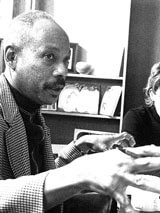Frank J. Oldham, Jr. leaves post after 17 months to Head Harlem Directors Group
“This is a paramount opportunity to really make a difference in what I call the heart of the epicenter of the epidemic,” Oldham said. “Harlem is really disproportionately affected by AIDS.”
Oldham will leave his city job on June 11 and become the executive director at the Harlem group on June 14. With an annual budget of between $3 and $4 million and a staff of 12, the group coordinates services for people with AIDS among its member organizations and advocates for resources for the Harlem area.
“I believe in fate sometimes and this is an opportunity that I couldn’t resist,” Oldham said. “I always take challenges and this is a good one.”
Among his successes heading the Office of AIDS Policy Coordination, Oldham cited this year’s award to the city of $122 million in federal funds for AIDS services, an increase of $18.2 million over the previous year. Cities across the country apply for those funds each year and last year’s application resulted in a $14.6 million cut in the city’s award compared to the previous year.
Oldham touted a speaker’s bureau he created that sends people with AIDS out to talk about their experience and his effort to implement “data-driven” strategic planning to determine what services are needed and where to best serve New Yorkers with AIDS.
Oldham became the AIDS czar in January 2003, but his introduction came in March at a conference that drew AIDS groups from across the country to New York City. Speaking to thousands of conferees, Mayor Michael R. Bloomberg set two goals for his administration.
“First, to become the national model in leading the Centers for Disease Control and Prevention goal of reducing new HIV infections in the United States by 50 percent by 2005 and, second, to provide the best HIV/AIDS care and treatment in the world,” he said.
Oldham was the point man on those initiatives.
“The challenge for achieving both of these goals is in Frank Oldham, Jr., our recently appointed citywide coordinator for AIDS policy,” the mayor said.
In the next city budget, Oldham’s office was taken out of City Hall, where he reported to Deputy Mayor Dennis Walcott, and placed in the health department, with Oldham reporting to Dr. Thomas R. Frieden, the health commissioner, and Dr. Marjorie Hill, assistant commissioner for HIV/AIDS Services.
The move was described as a cost saving measure and Oldham called it a “reorganization,” but AIDS groups across the city saw it as an attack on the office’s clout. That same budget also proposed privatizing some 1,300 HASA case manager jobs and cutting another 400.
Those proposals angered AIDS groups and some of that heat was directed at Oldham. Housing Works, an AIDS services agency, called on Oldham to resign.
“We called for his resignation because when they publicly humiliate you it’s time to walk away, but I think at that point he thought he could really make a difference,” said Terri Smith-Coronia, director of New York City policy at Housing Works. “That wasn’t the case.”
Oldham praised the mayor and the health commissioner saying they had moved the city forward on the mayor’s two goals.
“We have a mayor who is committed to making the lives of people living with HIV and AIDS better and committed to stopping the spread of HIV in the city,” Oldham said. “To have a health commissioner with a real public health agenda and to have made AIDS a major part of that agenda I feel that we have all the makings to make New York City a success.”
Despite the fire he drew while with the city, Oldham is viewed by activists as likely to do well at the Harlem group.
“I know that he will probably do wonderful work up in Harlem,” Smith-Coronia said. “It’s unfortunate that [Frieden] did not use Frank’s talents in a more effective manner.”
Gary English, executive director at People of Color in Crisis, a Brooklyn AIDS group, also praised Oldham.
“I wish Frank the best,” he said. “I think the community is gaining a lot with Frank’s experience and I think Harlem will do very well with Frank at the head of the Harlem Director’s Group.”


































